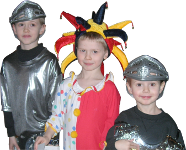Esther (how to dramatize)
 When my children studied the book of Esther, we re-enacted the story with costumes and a script. An older child can write the script, or you can purchase one, or you can ad-lib it. Most of the time when we dramatize a Bible story, we will just make it up as we go, based on the story and how the characters would have felt.
When my children studied the book of Esther, we re-enacted the story with costumes and a script. An older child can write the script, or you can purchase one, or you can ad-lib it. Most of the time when we dramatize a Bible story, we will just make it up as we go, based on the story and how the characters would have felt.
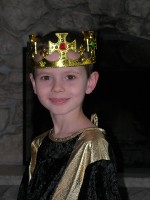 At the beginning of the story, Queen Vashti refused to come to the king when he called her in a drunken stupor. My daughter folded her arms and refused to come. As a result, the king wished to replace his queen, and he looked all over the kingdom for beautiful women.
At the beginning of the story, Queen Vashti refused to come to the king when he called her in a drunken stupor. My daughter folded her arms and refused to come. As a result, the king wished to replace his queen, and he looked all over the kingdom for beautiful women.
Esther was found, and she had beauty treatments. She was chosen by the king as his next queen. Mordecai was like an adopted father for Esther, who was an orphan. He refused to bow down to Haman, who was the wicked second-in-command ruler. So Haman decided to have Mordecai and all his people (the Jews) killed.
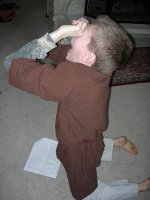 Mordecai sat in sackcloth and ashes, crying out to God in anguish for his people. My son Bryan did a good job in capturing the emotion of that scene. (No, we didn't use ashes, but you could if you went outside, I suppose. You'd get the costume dirty, though.) Mordecai sent for Esther, to ask her to implore the king to spare her people.
Mordecai sat in sackcloth and ashes, crying out to God in anguish for his people. My son Bryan did a good job in capturing the emotion of that scene. (No, we didn't use ashes, but you could if you went outside, I suppose. You'd get the costume dirty, though.) Mordecai sent for Esther, to ask her to implore the king to spare her people.
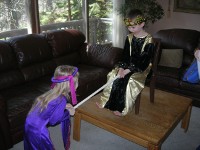 Esther was scared as she entered the king's presence, since people were put to death for such things. But the king extended his scepter to Esther as she bowed down. (My son Nathaniel enjoyed being the king. His little sister doesn't usually show such respect to him!) She invited the king and Haman to dinner three times. The children enjoyed eating their three dinners at the coffee table with the silver goblets and fake food.
Esther was scared as she entered the king's presence, since people were put to death for such things. But the king extended his scepter to Esther as she bowed down. (My son Nathaniel enjoyed being the king. His little sister doesn't usually show such respect to him!) She invited the king and Haman to dinner three times. The children enjoyed eating their three dinners at the coffee table with the silver goblets and fake food.
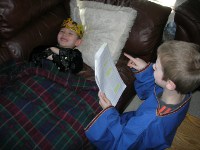 But before the third dinner took place, Haman built a gallows so that he could hang Mordecai. Meanwhile, the king couldn't sleep, so he had a servant read him some boring chronicles of palace life. The servant read that Mordecai had saved his life, so he decided to reward him, since Mordecai hadn't been rewarded yet.
But before the third dinner took place, Haman built a gallows so that he could hang Mordecai. Meanwhile, the king couldn't sleep, so he had a servant read him some boring chronicles of palace life. The servant read that Mordecai had saved his life, so he decided to reward him, since Mordecai hadn't been rewarded yet.
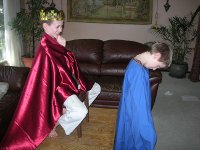 Lo and behold, Haman was whistling as he walked down the halls of the palace in the middle of the night. (What was he doing there anyway, at that time of night?) The king asked him how to reward someone that he wanted to honor. Haman thought he was the one who was going to be honored, so he said to put the man on the king's horse, with royal robes and a crown on his head, and parade the man down the street. In an ironic twist of fate, the king stated, “Do all this for Mordecai.” I can only imagine how horrified Haman felt, and humiliated, too, to show honor to the man he wanted to murder.
Lo and behold, Haman was whistling as he walked down the halls of the palace in the middle of the night. (What was he doing there anyway, at that time of night?) The king asked him how to reward someone that he wanted to honor. Haman thought he was the one who was going to be honored, so he said to put the man on the king's horse, with royal robes and a crown on his head, and parade the man down the street. In an ironic twist of fate, the king stated, “Do all this for Mordecai.” I can only imagine how horrified Haman felt, and humiliated, too, to show honor to the man he wanted to murder.
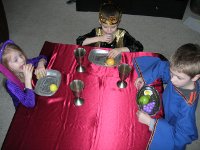 At the last dinner with Esther, she asked the king to spare her people. She told the king that Haman was trying to kill her people, the Jews. The king left the room, and Haman got on his knees and begged Esther to spare him. (I think Rachel enjoyed her brother's begging.) The king walked in and ordered that Haman be hung on his own gallows. (No, we didn't act out the gallows scene.)
At the last dinner with Esther, she asked the king to spare her people. She told the king that Haman was trying to kill her people, the Jews. The king left the room, and Haman got on his knees and begged Esther to spare him. (I think Rachel enjoyed her brother's begging.) The king walked in and ordered that Haman be hung on his own gallows. (No, we didn't act out the gallows scene.)
 Thankfully, the Jews were able to defend themselves, so a mass genocide did not occur that day. The feast of Purim is celebrated by the Jews to this day, to commemorate this historic event.
Thankfully, the Jews were able to defend themselves, so a mass genocide did not occur that day. The feast of Purim is celebrated by the Jews to this day, to commemorate this historic event.








